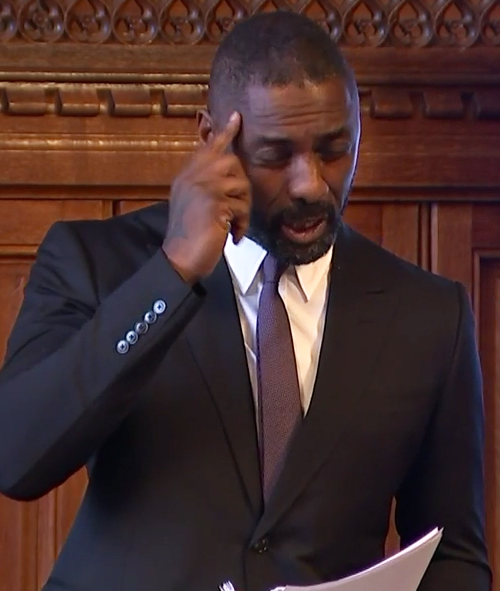 You know you can carve out 32 minutes for Idris Elba. My favorite part of this speech he recently gave in the UK about the television industry, other than its wide grasp of diversity being about much more than skin color (the frequent references to how women are marginalized is most welcome), is the acknowledgement and gratitude to the people behind the scenes, especially casting directors, who've helped actors like himself break out of stereotypes and industry-prescribed boxes. The key, he wisely stresses, is imagination. [More...]
You know you can carve out 32 minutes for Idris Elba. My favorite part of this speech he recently gave in the UK about the television industry, other than its wide grasp of diversity being about much more than skin color (the frequent references to how women are marginalized is most welcome), is the acknowledgement and gratitude to the people behind the scenes, especially casting directors, who've helped actors like himself break out of stereotypes and industry-prescribed boxes. The key, he wisely stresses, is imagination. [More...]
I mention this sense of gratitude that pervades the speech first because too often, especially in our reigning outrage culture, you see people latching on to the negative as if all things can be cleansed in the fire of communal anger.
Idris makes a fine beautiful point here, that what makes the most difference is what's in our heads. He gives good quote...
Diversity is more than a skin color: it's gender, age, disabiliity, sexual orientation, social background. And most importantly, in my opinion, it's diversity of thought.
If you have genuine diversity of thought among people that make television and film than you accidently won't shut out some of the groups I just mentioned just now.
[Aside: The only part of the speech I don't understand is the repeated references to leaving the UK for the US for his star-making role in Luther. I have readily acknowledged my lack of tv knowledge over the years -- so sometimes I am slow to catch on to rising TV stars... Idris among them a handful of years ago. But Luther is a British production. Perhaps Idris fans could clear up the confusion... or does what he's saying make perfect sense if you followed his early career?]

P.S. Here's a little something that's been needling away at me since this topic became all anyone would talk about post Oscar: I have yet to read in any argument about diversity in film where anyone mentions filmmakers of the past who tried to reflect actual American diversity like Jonathan Demme. I was thinking about Demme this past summer in regards to this very issue when Ricki and the Flash came out (mostly because our beloved musical giant Audra McDonald was squaring off with Meryl Streep in a key scene). I ended up abandoning the article, which was about casting specifically rather than diversity, but the kernel of it hasn't left my mind. I was horrified some years ago when Rachel Getting Married was getting raked over the coals in the media and online for its "unrealistic" diversity, taking place as it did during the course of a multiethnic wedding. As someone who had attended a biracial wedding earlier that year that incorporated Mormons and Buddhists and Unitarians and a lot of gay people (even though the newly weds were a man and a woman) I thought ... what on earth is unrealistic about this movie aside from maybe how wealthy everyone is !?! Yet you never hear people praising filmmakers like Demme and team or other filmmakers who've always cast minorities in parts that would have gone to white actors as "default" with lesser filmmakers. You only very rarely hear people thanking people who've made a difference in contributing to the gradual dismantling of systemic biases. You only hear complaints. The world is poorer for this lack of a wider perspective about those that have and are currently trying to can make a difference, or as Idris puts it here, those with imagination. If systemic problems come from people, so does the solution.